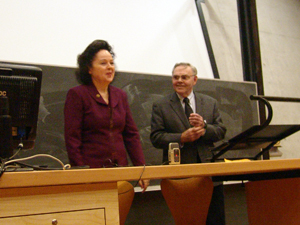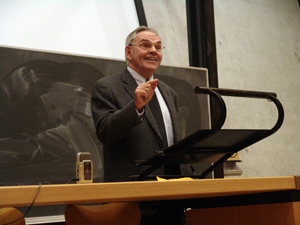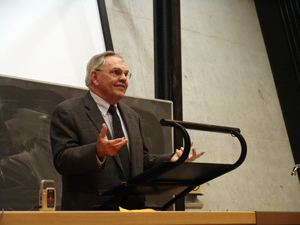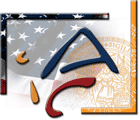American Corner Innsbruck
Lecture by Prof. C.F. (Neil) Delaney
SOME MORAL DIMENSIONS OF SCIENTIFIC RESEARCH
January 20, 2010, 7.30 p.m., HS 3 SoWi (Universitätsstr. 15, EG Ost)



The American Corner and the Arbeitskreis Wissenschaft und Verantwortlichkeit were pleased to welcome back Prof. Cornelius Delaney, full Professor of Philosophy at Notre Dame University, Indiana. This time Prof. Delaney, who had previously contributed to the ACI’s public lecture series with a talk on political liberalism and the philosophy of John Rawls, did not focus on a single philosopher, but on a host of ethical questions orbiting scientific research.
In order not to get tangled up in the additional layers of complexity that the social sciences entail, the presentation concentrated on natural sciences instead, trying to shed light on those moral dimensions concerned with both conduct and content of scientific inquiry. Beginning with issues revolving around the traits of individual scientists (who might already introduce elements of dishonesty by not appropriately distributing credit for their research or who might overstep the thin line between putting the best spin on their results and misrepresenting them), Prof. Delaney continued by extending his arguments to the entire scientific community in which results are more often cloistered than shared.
These arguments, however, were but a prelude to the numerous ethical side-constraints on scientific conduct and content that followed. Beginning with straightforward cases such as the Nazi experiments on human beings, Prof. Delaney moved on to more complicated ethical issues such as embryonic stem-cell research, which polarize because of the blurry definition of their research objects’ legal status. Other intriguing questions raised in the presentation concerned the issue of using morally contaminated information (i.e. knowledge that results from ethically questionable research) or cases revolving around the acquisition of “forbidden knowledge” (i.e. knowledge that is either not worth knowing or really bad to know) through discriminatory research aims such as probing the relation of race or gender to intelligence, which would be socially disruptive by aiding and abetting racism or sexism, respectively. Prof. Delaney furthermore humorously exemplified the deeply moral aspect inherent to specific scientific answers by aliens swooping down to earth and extending to mankind the ultimate answer to the question of human determinism. Though such knowledge certainly is tempting to obtain, it must be acknowledged that its acquisition would involve another trauma to human self-esteem and the further de-centering of man, thus posing another ethical challenge.
In the face of the supersaturation of science with moral considerations and ethical side-constraints, the Q&A session following the talk produced the question if there was a general recipe for dealing with ethical questions, to which our presenter answered with a smile: “Good philosophy courses.” Prof. Delaney’s talk on the moral dimensions of scientific research definitely belongs to that category.
(text: Andreas Leisner)
C.F. (Neil) Delaney
Neil Delaney is full Professor of Philosophy at Notre Dame University, Indiana, USA. With a Ph.D. from St. Louis University, he joined the Notre Dame faculty in 1967 and chaired the philosophy department for more than 10 years. Since 1990, Professor Delaney has directed the university’s Honors Program for particularly gifted students. His research is informed by pragmatism and concentrates on political philosophy and legal philosophy as well as the history of modern philosophy. Professor Delaney is currently working on a monograph on C.S. Peirce and another one on American Philosophy in the Twentieth Century.


